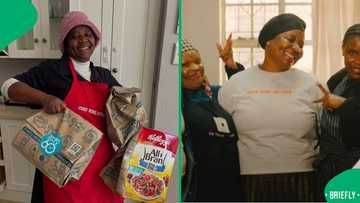“I Doubted It Could Happen”: Thobeka Ntini Goes From Domestic Worker at 13 to a PhD Graduate
- Doctor Thobeka Ntini-Makununika began working as a part-time domestic worker at just 13 years old, balancing household chores with her school responsibilities
- She rose above challenges to earn a PhD that critically examines domestic work itself, turning her life experience into research that challenges how the world views domestic workers
- In an exclusive interview with Briefly News, Dr Thobeka reflected on her journey and the deeper meaning, honouring the generations of women in her family
- Ntini has been named one of the participants in the Briefly News Women of Wonder: The Real Housekeepers of Mzansi for her resilience and determination to rewrite her story

Source: Facebook
South African academic Thobeka Ntini-Makununika is living proof that humble beginnings do not have to define your future. Once a teenage domestic worker who cleaned and ironed in other people’s homes, she now holds a PhD in Political and International Studies and is using her voice to spotlight the strength, dignity, and untold stories of women in invisible labour.

Read also
"May this inspire others": Domestic worker with viral business gives back to community, SA moved
Her remarkable journey forms part of the 2025 Briefly News Women of Wonder: The Real Housekeepers of Mzansi, a storytelling project launched in honour of Women's Month to celebrate South African women rewriting their narratives against all odds. Her journey is not just one of personal triumph, but a message of hope for every girl who dreams of more than what society expects of her.
A journey that began at 13
Ntini’s story begins in her early teens. She started working part-time as a domestic worker at the age of 13, following in the footsteps of her grandmother, mother and her aunts.
PAY ATTENTION: Briefly News is now on YouTube! Check out our interviews on Briefly TV Life now!
“I come from a lineage of women who worked in other people’s homes," she said, adding they all laboured quietly in the background of other families’ lives.
While other girls her age were navigating high school, Ntini was navigating household tasks, scrubbing floors, washing dishes, and ironing clothes. But even in the middle of routine chores, she felt the stirrings of a bigger dream.
Even before she knew what a PhD was, the desire for something more was a constant in Ntini's life. "I always knew that wasn’t all life could offer," she recalls. Her early questions about justice, power, and dignity eventually shaped her academic career, fueled by a deep-seated desire for freedom and a drive to "speak for women like us".

Read also
"I can keep going": A Joburg housewife shows her soft life in Japan that has Mzansi drooling

Source: Facebook
Overcoming loss, poverty, and invisibility
Life was far from easy. Ntini faced poverty and the devastating loss of her parents while still young. The weight of invisibility, the feeling of being unnoticed or underestimated, pressed on her, but she refused to give up. The defining moment came when she received her doctoral graduation letter.
“I cried, not because I doubted it could happen, but because I had held on through so much, loss, poverty, and doubt. That letter wasn’t just about academic success. It was a declaration that my story mattered, that I had rewritten it with my own hands.”
The title 'Doctor Ntini-Makununika' carries deep meaning for her. Earning her degree was more than just a personal achievement; it was a victory for her entire community.
As she puts it, the diploma felt "like reclaiming something that was always mine". Ntini explained that her name on the degree "carries the pride of my grandmother's hands, the strength of my aunt's back, and the prayers of every domestic worker who came before me".
Honouring the voices of domestic workers
Throughout her studies, Ntini made domestic work the centre of her research. She wanted to document the resilience and untold stories of the women who shaped her life.
“Society often assumes that domestic workers are unskilled or without ambition. That couldn’t be further from the truth. These women are caregivers, problem solvers, and household economists. They are holding together entire families with what little they earn. What they lack is not the voice, but the mic.”
Her PhD became that microphone, shining a light on the contributions, struggles, and wisdom of women who are often overlooked. She vividly remembers one interview with a 58-year-old participant who told her:
“Thank you for opening our eyes, you’ve taken us out of darkness into light.”
In that moment, Ntini realised her journey was about more than education; it was about honouring the resilience of women whose strength often goes unseen.

Source: Facebook
Sacrifices and determination

Read also
"Loyalty is key": Beauty shares raw truths about life as a domestic worker and social media fame
For Ntini, the road to a PhD meant a relentless pursuit of discipline. While she doesn’t dwell on sacrifice, she admits that every achievement came with trade-offs.
“Whether it was time, comfort, or rest, I made peace with the fact that discipline was the price of my dream. What kept me going were the hopeful eyes of domestic workers who shared their stories with me. I couldn’t let their sacrifices, or the sacrifices of the women who raised me, be in vain.”
Her journey is more than a personal victory; it’s a crack in the wall of what’s deemed possible.
Inspiring the next generation of women
Today, Ntini’s legacy is one of possibility. She hopes her journey inspires women in invisible labour to recognise their worth and potential. Ntini added that she wants young girls to know that their beginnings do not define their endings.
The PhD graduate is proof that a domestic worker’s uniform can one day be exchanged for a graduation gown. She hopes her story helps young women know they are worthy of love, education, dignity, and joy, just as they are.
Her dream is to rewrite the narrative for women like her in South Africa, shifting the lens from labour to humanity.
“I’d want the world to see us as thinkers, mothers, dreamers, fighters, not as background figures. We are not victims of poverty, but survivors of it. Our stories deserve to be told with dignity, complexity, and truth.”

Source: Facebook
Leaving a legacy of hope
Thobeka Ntini-Makununika’s journey from scrubbing floors to achieving academic excellence is not just a story of personal triumph; it is a call to society to rethink how it sees and values domestic workers.
Her life stands as a testament that invisible labour does not mean invisible dreams. For every woman who cleans, cooks, or cares in silence, Ntini’s story whispers a powerful message: anyone can do it.
3 Other Briefly News stories on Women of Wonder
- Johannesburg-based Laiza Moyo started cleaning teachers' cottages in Zimbabwe as a high school student and now works as a House Executive.
- Nelia Ngulube, a Johannesburg domestic worker with 16 years of experience, has recently found sweet success in her new venture.
- A dedicated domestic worker named Seneria Moyo had overcome humble beginnings to build a better life for her family through hard work and determination.
Proofreading by Roxanne Dos Ramos, copy editor at Briefly.co.za.
Source: Briefly News



